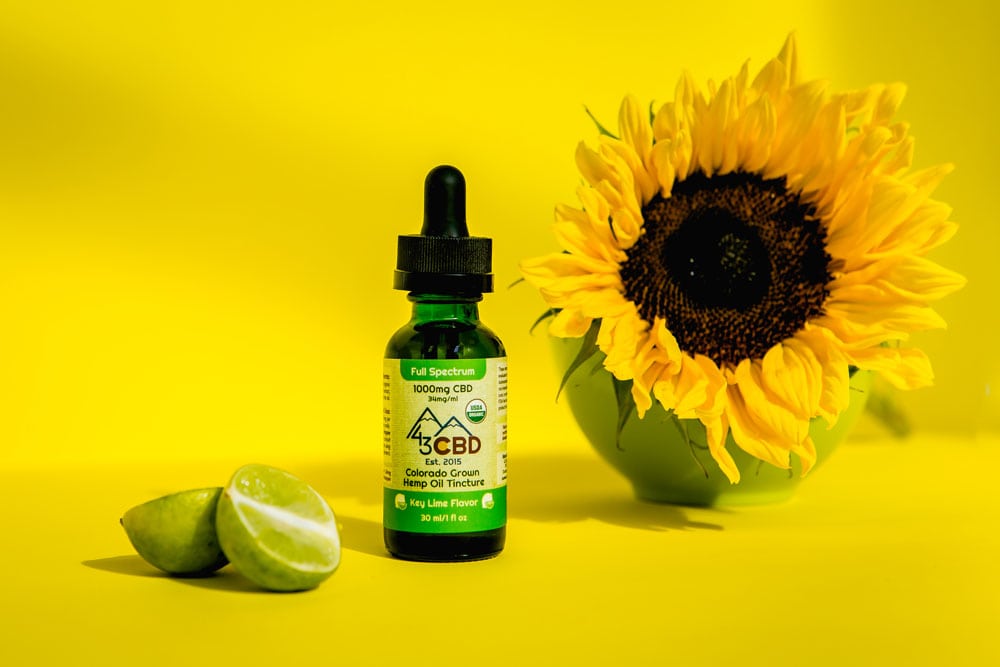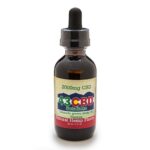
There are many different plant-based oils that can be used for a variety of products including well-known options like olive oil, coconut oil, and avocado oil.
While you may be familiar with many of these carrier oils, there is one healthy oil that is starting to build major recognition in the wellness community – sunflower oil.
Sunflower oil is processed from the seeds of sunflower plants and is well-received for its health benefits due to its low saturated fat content and high levels of polyunsaturated and monounsaturated fatty acids.
Polyunsaturated fatty acids are known to promote heart health and can reduce cholesterol levels in your blood – reducing the risk of heart disease and stroke. They include essential fats like omega-6 and omega-3 fatty acids, which are a fundamental part of a healthy balance of many functions in the body. They are especially useful when substituted for saturated fats and trans fats, which can be bad for your health. [1]
Monounsaturated fatty acids can also lower the risk of heart disease and stroke by reducing bad cholesterol levels in the blood. They include important nutrients that can help maintain and develop your body’s cells. [2]
Aside from the high content of healthy fatty acids, it also contains high levels of linoleic acid, oleic acid, and Vitamins E, A, C, and D. In fact, sunflower oil possesses more vitamin E than any other vegetable oil commonly used by consumers.
Let’s explore some of the potential benefits of sunflower seed oil and why it is an incredible choice as a carrier oil for many health and skincare products.
5 Potential Benefits of Sunflower Oil
The healthy levels of fatty acids and high content of vitamins and nutrients make sunflower oil an excellent addition to your health regimen. Here are some of the benefits associated with this natural and unrefined oil.
Promotes a Healthy Heart
Choosing the right type of fats for your diet can reduce bad cholesterol levels and decrease the risk of heart disease and type 2 diabetes. [3] The polyunsaturated and monounsaturated fatty acids found in sunflower oil promote a healthy heart and are effective when replacing “bad fats”.
Unhealthy fats include saturated fat and trans fat. Saturated fats are typically found in red meat, dairy products, and poultry. They can raise bad cholesterol levels in the blood, increasing the risk of cardiovascular disease. Trans fat is a naturally occurring fat found in foods that are often processed through a method known as partial hydrogenation. This process adds hydrogen to vegetable oil to increase the shelf-life and flavor of products like shortening and margarine.
The Dietary Guidelines for Americans suggest that replacing saturated fats with healthier unsaturated fats, such as the ones found in sunflower oil, can lower bad LDL cholesterol and promote a healthier heart.
Natural Energy Booster
Did you know that your body needs fat for energy and growth? Fats are the most energy-efficient form of food, providing more than twice the number of calories than proteins or carbohydrates.
There was once a time where fat was frowned upon for a healthy diet and in return, people replaced fats in their diet with more sugar, carbohydrates, and processed foods – making them less healthy and more energy-deficient.
Now, with additional research and a deeper understanding of our bodies, experts recommend fats for a well-balanced diet and healthy energy levels – especially promoting the replacement of saturated and trans fats with healthy fats, like the ones found in sunflower oil.
Many people look to energy-boosting snacks like avocados, nuts, chia seeds, and dark chocolate before or after high-intensity exercise. These snacks are among many that are high in healthy fats and help boost energy levels to keep people actively pushing forward. The same goes for sunflower oil, which contains both polyunsaturated and monounsaturated healthy fats.
Promotes Healthy Skin
Sunflower oil boasts a higher content of Vitamin E than any other vegetable oil making it great for maintaining healthy skin. Vitamin E is an essential component for skin protection from various elements that are introduced to our bodies daily.
Every day, our skin is exposed to UV light, air pollution, and smoke pollution. When exposed to these elements, skin creates free radicals and other molecules that damage skin cells and collagen, the structural components of skin and cartilage. This ultimately leads to aging skin, wrinkles, and brown spots. Vitamin E helps protect the skin by fighting these effects and by neutralizing the free radicals that damage collagen. Since sunflower oil has such a high concentration of vitamin E, it’s a great choice for a carrier oil.
In fact, vitamin E is also known for keeping skin hydrated since it forms a healthy barrier around skin cells – keeping the skin looking more youthful.
Vitamin E also absorbs ultraviolet B light, which is responsible for sunburn and other signs of sun damage including wrinkles, liver spots, solar elastosis, and leathery skin. [4]
Research shows us that a combined systemic effect from vitamin C with vitamin E results in a reduction of sunburn reaction, which could indicate a reduced risk of more severe UV-induced skin damage. [5]
Anti-Inflammatory Properties
Chronic inflammation can be a risk factor for many long-term diseases and sunflower oil may be able to reduce this with its anti-inflammatory properties. In a research study conducted with over 6,000 participants, results showed that frequent seed consumption was associated with reduced levels of inflammatory markers. The study believes that this association may partially explain the health benefits of seeds when dealing with cardiovascular disease.
It is believed that sunflower oil may present anti-inflammatory properties due to the high levels of vitamin E and healthy polyunsaturated and monounsaturated fats. Vitamin E has been shown to help lower C-reactive protein levels, which leads to decreased inflammation in diabetic patients.
Antioxidant Properties
Sunflower seed oil has a high content of vitamin E and selenium, which function as antioxidants – protecting the body’s cells from free radical damage. It is also a source of flavonoids and phenolic acid, which are beneficial plant compounds that act as antioxidants.
Free radicals can be damaging to the body and can potentially play a role in chronic diseases including cancer, diabetes, heart disease, and skin disease. Having a diet with products and foods that have antioxidants, like those found in sunflower oil, can help improve your health and assist with disease prevention.
Potential Cautions with Sunflower Oil
While sunflower oil is viewed as a healthy oil providing benefits for heart health and inflammation, it has been shown to release toxic compounds with prolonged exposure to higher temperatures. This is the case when the oil is overheated in a culinary setting. Experts recommend using the oil for only low-heat cooking.
Another caution to consider is that sunflower oil has higher levels of omega-6 polyunsaturated fatty acids than other vegetable oils, which should not be taken in excess to imbalance the body. Like everything- moderation is key. Too much of anything can be detrimental to our bodies.
Sunflower Oil as a Carrier Oil for CBD
Sunflower oil is an excellent choice to blend with CBD extract to craft high-quality tinctures. It is light in taste and appearance, which helps maintain balanced flavors. The high levels of polyunsaturated and monounsaturated fatty acids also help the body digest the CBD, making the combination more bioavailable than many other carrier oils.
Like other digestible oils, it’s important to consider organic sunflower oil so you can be sure that it has been processed and crafted to the highest standards.
At 43 CBD Solutions, we use organic sunflower oil in our brand new flavors – Key Lime and Orange. This smart blend allows you to enjoy a crisp citrus aroma and the many potential health benefits listed above.
As with all our full spectrum oils, these Key Lime and Orange tinctures are USDA Organic Certified and contain zero contaminants or harmful chemicals, from the soil to the finished product.
Resources:
- https://www.heart.org/en/healthy-living/healthy-eating/eat-smart/fats/polyunsaturated-fats
- https://www.heart.org/en/healthy-living/healthy-eating/eat-smart/fats/monounsaturated-fats
- https://www.mayoclinic.org/healthy-lifestyle/nutrition-and-healthy-eating/in-depth/fat/art-20045550
- https://onlinelibrary.wiley.com/doi/abs/10.1002/mc.10055
- https://www.sciencedirect.com/science/article/abs/pii/S0190962298705377









